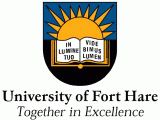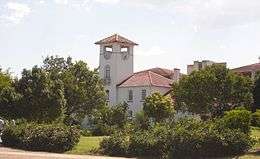University of Fort Hare
 | |
| Motto | In lumine tuo videbimus lumen ("In your light we shall see the light") |
|---|---|
| Type | Public university |
| Established | 1916 |
| Chancellor | Dumisa Buhle Ntsebeza |
| Vice-Chancellor | Sakhela Buhlungu[1] |
| Students | 13,331 (2015) |
| Location |
Main campus: Alice Other: Bhisho East London, Eastern Cape, South Africa Coordinates: 32°47′13.4″S 26°50′56.7″E / 32.787056°S 26.849083°E |
| Website | http://www.ufh.ac.za/ |
The University of Fort Hare is a public university in Alice, Eastern Cape, South Africa.
It was a key institution of higher education for black Africans from 1916 to 1959. It offered a Western-style academic education to students from across sub-Saharan Africa, creating a black African elite. Fort Hare alumni were part of many subsequent independence movements and governments of newly independent African countries.
In 1959, the university was subsumed by the apartheid system, but it is now part of South Africa's post-apartheid public higher education system.
History

Originally, Fort Hare was a British fort in the wars between British settlers and the Xhosa of the 19th century. Some of the ruins of the fort are still visible today, as well as graves of some of the British soldiers who died while on duty there.
During the 1830s, the Lovedale Missionary Institute was built near Fort Hare.[2]:419 James Stewart, one of its missionary principals, suggested in 1878 that an institution for higher education of black students needed to be created.[2]:419 However, he did not live to see his idea created into reality [2]:419 when, in 1916, Fort Hare was established with Alexander Kerr as its first principal. D.D.T Jabavu was its first black staff member who lectured in Latin and black languages.[2]:419 In accord with its Christian principles, fees were low and heavily subsidised. Several scholarships were also available for indigent students.
Fort Hare had many associations over the years before it became a university in its own right. It was initially the South African Native College attached to the University of South Africa.[2]:419 Then as the University College of Fort Hare associated with Rhodes University.[2]:419 In 1959, with the passing of the Promotion of Bantu Self Government Act, higher educational institutions would be strictly segregated along racial lines and saw Fort Hare becoming a black university in its own right in 1970, strictly controlled by the state government.[2]:419
It was a key institution in higher education for black Africans from 1916 to 1959. It offered a Western-style academic education to students from across sub-Saharan Africa, creating a black African elite. Fort Hare alumni were part of many subsequent independence movements and governments of newly independent African countries.[3]
Several leading opponents of the apartheid regime attended Fort Hare, among them Nelson Mandela and Oliver Tambo of the African National Congress, Mangosuthu Buthelezi of the Inkatha Freedom Party, Robert Sobukwe of the Pan Africanist Congress, Desmond Tutu, Kenneth Kaunda, Julius Nyerere, Robert Mugabe and Joshua Nkomo. Mandela who studied Latin and physics there for almost two years in the 1940s, left the institution as a result of a conflict with a college leader. He later wrote in his autobiography that “For young black South Africans like myself, it was Oxford and Cambridge, Harvard and Yale, all rolled into one.”[3]
During the apartheid years, the school was nationalized and segregated along racial and tribal lines; blacks had previously gone to classes with Indians, coloureds and a few white students.[3] It became part of the Bantu education system and teaching in African languages rather than English was encouraged.[3]
After the end of apartheid, Oliver Tambo became chancellor of the University in 1991.[3]
University
The University's main campus is located in Alice, near the Tyhume River. It is in the Eastern Cape Province about 50 km west of King William's Town, in a region that for a while was known as the "independent" state of Ciskei. In 2011, the Alice campus had some 6400 students. A second campus at the Eastern Cape provincial capital of Bhisho was built in 1990 and hosts a few hundred students, while the campus in East London, acquired through incorporation in 2004, has some 4300 students. The University has five faculties (Education, Law, Management & Commerce, Science & Agriculture, Social Sciences & Humanities) all of which offer qualifications up to the doctoral level.
University of Fort Hare Strategic Plans
Following a period of decline in the 1990s, Professor Derrick Swarts was appointed Vice-Chancellor with the task of re-establishing the University on a sound footing. The programme launched by Swarts was the UFH Strategic Plan 2000. The plan was meant to address the university's financial situation and academic quality standards simultaneously. The focus of the university was narrowed and consequently 5 faculties remained:
- Education
- Science & Agriculture
- Social Sciences & Humanities
- Management & Commerce
- Law
Further narrowing the focus, 14 institutes were founded to deal with specific issues, such as the UNESCO Oliver Tambo Chair of Human Rights. Through their location the institutes have excellent access to poor rural areas, and consequently emphasis is placed on the role of research in improving quality of life and economic growth (and especially sustainable job creation). Among the outreach programmes, the Telkom Centre of Excellence maintains a "living laboratory" of 4 schools at Dwesa on the Wild Coast, which have introduced computer labs and internet access to areas that until 2005 did not even have electricity. The projects at Dwesa focus research on Information and Communication for Development (ICD).
Incorporation of Rhodes University's former campus in East London in 2004 gave the University an urban base and a coastal base for the first time. Subsequent growth and development on this campus have been rapid. Initial developments of the new multi-campus university were guided by a three-year plan; currently the University is following the new "Strategic Plan 2009-2016", set to take the institution to its centennial year.
Notable alumni
| Name | DoB - DoD | Notes |
|---|---|---|
| Z. K. Matthews | 1901 – 1968 | Lectured at Fort Hare from 1936 to 1959 |
| Archibald Campbell Jordan | 30 October 1906–1968 | Novelist, pioneer of African studies |
| Govan Mbeki | 9 July 1910 – 30 August 2001 | South African politician |
| Yusuf Lule | 1912 - 21 January 1985 | Interim president of Uganda 1979 |
| Cedric Phatudi | 27 May 1912 – 7 October 1987 | Former Chief Minister of Lebowa 1972–1987 |
| Kaiser Matanzima | 5 June 1915 - 15 June 2003 | President of bantustan Transkei |
| Mary Malahlela | 2 May 1916 – 8 May 1981 | First female black doctor in South Africa |
| Oliver Tambo | 27 October 1917 – 24 April 1993 | African National Congress activist, expelled while doing his second degree |
| Nelson Mandela | 18 July 1918 - 5 December 2013 | Former President of South Africa; expelled and later attended the University of the Witwatersrand but did not graduate |
| Lionel Ngakane | 17 July 1920 – 26 November 2003 | South African film maker |
| Seretse Khama | 1 July 1921 – 13 July 1980 | First President of Botswana |
| Julius Nyerere | 19 July 1922 – 14 October 1999 | President of Tanzania |
| Herbert Chitepo | 15 June 1923 – 18 March 1975 | ZANU leader |
| Robert Sobukwe | 1924 - 27 February 1978 | Founder of the Pan Africanist Congress |
| Robert Mugabe | 21 February 1924 - | President of Zimbabwe, attended 1949–1951 |
| Kenneth Kaunda | 28 April 1924 - | First President of Zambia |
| Allan Hendrickse | 22 October 1927 – 16 March 2005 | Politician, preacher, and teacher |
| Mangosuthu Buthelezi | 27 August 1928 - | Leader of the Inkatha Freedom Party, never graduated but transferred to University of Natal. Leader of KwaZulu Bantustan in apartheid South Africa |
| Leepile Moshweu Taunyane | 14 December 1928 – 30 October 2013 | Life President of Premier Soccer League, President of the South African Professional Educators Union |
| Desmond Tutu | 7 October 1931 - | Archbishop Emeritus, South African peace activist, Chaplain at Fort Hare in 1960 |
| Frank Mdlalose | 29 November 1931 - | First Premier of KwaZulu-Natal |
| Ivy Matsepe-Casaburri | 18 September 1937 – 6 April 2009 | Minister of Communications, South Africa |
| Manto Tshabalala-Msimang | 9 October 1940 – 16 December 2009 | Minister of Health of South Africa |
| Chris Hani | 28 June 1942 – 10 April 1993 | Leader of the South African Communist Party - Expelled, later graduated at Rhodes University. |
| Wiseman Nkuhlu | 5 February 1944 - | economic advisor to former President Thabo Mbeki, Head of NEPAD |
| Makhenkesi Arnold Stofile | 27 December 1944 - | former Minister of Sport of South Africa |
| Sam Nolutshungu | 15 April 1945 – 12 August 1997 | South African scholar |
| Nyameko Barney Pityana | 7 August 1945 - | lawyer and theologian, former Vice-Chancellor of the University of South Africa |
| Bulelani Ngcuka | 2 May 1954 - | South Africa's former Director of Public Prosecutions |
| Loyiso Nongxa | 1954- | Vice-Chancellor of the University of the Witwatersrand |
| Joseph Diescho | 1955 - | Namibian novelist |
| John Hlophe | 1 January 1959 – | Judge President of the Cape Provincial Division of the High Court |
See also
- List of universities in South Africa
- A History of The University College of Fort Hare, South Africa - The 1950s, The Waiting Years by Donovan Williams; New York 2001 ISBN 0-7734-7398-X
References
- ↑ "University of Fort Hare appoints Prof Sakhela Buhlungu as new vice chancellor" (Times Media Group). Time Live. Retrieved 9 November 2016.
- 1 2 3 4 5 6 7 Maaba, Brown Bavusile (2001). "The Archives of the Pan Africanist Congress and the Black Consciousness-Orientated Movements". History in Africa. 28: 417–438. JSTOR 3172227. doi:10.2307/3172227. (Registration required (help)).
- 1 2 3 4 5 Samuel G. Freedman (27 December 2013) Mission Schools Opened World to Africans, but Left an Ambiguous Legacy New York Times. Retrieved 27 December 2013
External links
| Wikimedia Commons has media related to University of Fort Hare, South Africa. |